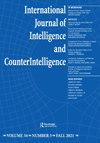军事情报:定义不清,研究不足
IF 0.5
Q4 INTERNATIONAL RELATIONS
International Journal of Intelligence and Counterintelligence
Pub Date : 2023-05-24
DOI:10.1080/08850607.2023.2187190
引用次数: 0
摘要
尽管军事情报具有核心重要性,但军事情报的研究和理论化程度仍然不足。这种疏忽部分源于其定义不明确以及难以区分“民用”和“军事”情报。现有的官方定义服务于工具性目的,而不是令人信服的推理路线,反映了国家军事情报架构的复杂和异构结构。通过使用经典的情报研究方法,有可能更好地理解军事情报可以定义的各种方式。但是,这种方法必须辅以对影响各国如何在其更广泛的情报体系中定义军事情报角色的“官僚争论”的五个经典要点的理解。这些包括任务划分、充足的作战人员支持、国家情报评估的一致性、军事情报内部的知识独立性和严谨性,以及军事专业知识的最佳组织和整合。本文章由计算机程序翻译,如有差异,请以英文原文为准。
Military Intelligence: Ill-Defined and Understudied
Abstract Despite being centrally important, military intelligence remains understudied and undertheorized. This negligence stems partly from its unclear definition and the difficult differentiation between “civilian” and “military” intelligence. The available official definitions serve instrumental purposes rather than compelling lines of reasoning and reflect the complex and heterogeneous structure of national military intelligence architectures. By using classical intelligence studies approaches, it is possible to get a better understanding of the various ways in which military intelligence can be defined. But such an approach must be complemented by an appreciation of five classic points of “bureaucratic contention” that influence how states define the role of military intelligence within their wider Intelligence Community. These are divided mandates, adequate warfighter support, consistency of national intelligence assessments, intellectual independence and rigor within military intelligence, and the optimal organization and integration of military expertise.
求助全文
通过发布文献求助,成功后即可免费获取论文全文。
去求助
来源期刊

International Journal of Intelligence and Counterintelligence
INTERNATIONAL RELATIONS-
CiteScore
1.00
自引率
22.20%
发文量
102
 求助内容:
求助内容: 应助结果提醒方式:
应助结果提醒方式:


